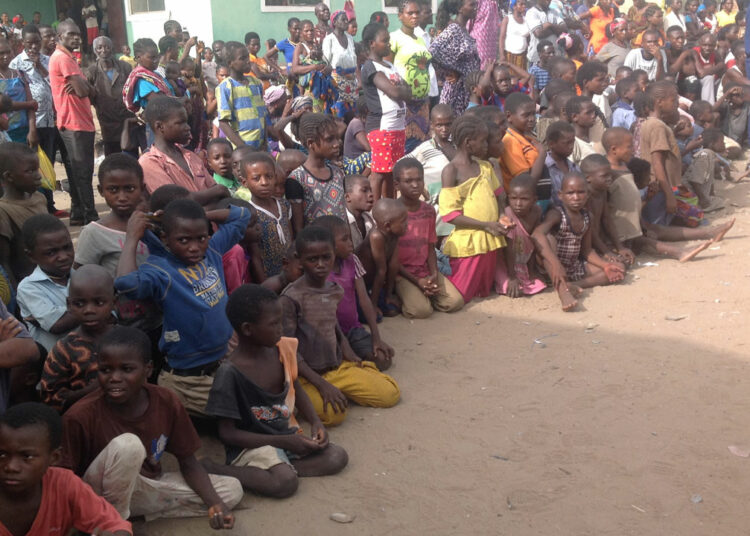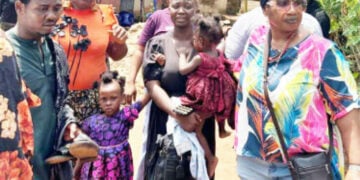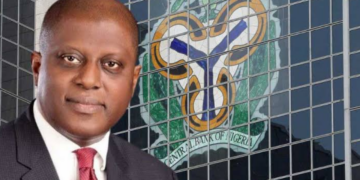Records show that about 159,454 children living in the Internally Displaced Persons (IDPs) camps across Benue State are going through emotional and psychological trauma which if not tackled will lead to a mentally deranged generation.
Our correspondent who visited some of the IDP camps observed that most of the children especially those who lost parents to the herdsmen crises appear restless, dejected, and hopeless.
Abigail Audu, a 12-year-old girl who lost her father during an attack by herdsmen at Bakin Korta in Guma local government, told our correspondent that she has been in the camp for over five years with her grandfather, her mother, and nine of her siblings.
When approached by our correspondent Abigail’s grandfather Audu who broke into tears said, I am speechless, I don’t know what to talk about.
He said staying alive to hear ‘the cry of my children when they were being butchered by the herdsmen with nothing to do alone is traumatizing, I don’t know why God kept me alive to watch all these, I am overwhelmed in sadness, for me life is meaningless, I am pained, watching these children grow without proper parental care and attention, our stay here is at the mercy of philanthropists and spirited individuals. But all I can say is God knows why.
Also, Little Mlumun a six-year-old orphan who is staying with her grandmother in the camp but could not speak fluently told our correspondent that her parents were killed by armed herdsmen and when asked whether her grandmother was around, she said no, saying she went out to solicit for help to buy food.
It was also observed that most of the people killed in these attacks are men who are predominantly heads of the family.
For 14-year-old Godwin Azahan who reportedly lost his father during an invasion by herdsmen at Kadarko said, they have been in the camp for over six years with his mother and four of his siblings, who at the time of the interview said they went out to do menial jobs to put food on their table.
While 11-year-old Aondoaver Godwin also said the herdsmen attacked their country home kyor in the Agan Council ward of Makurdi local government and his Father Aondoaver was killed in the attack, since then they reside in the IDPs camp with his mother and two of his siblings for over four years.
The four children Abigail, Azahan, Mlumun, and Godwin in a unanimous voice called on the government at all levels, philanthropists, spirited individuals, NGOs, the church, and international communities to come to the aid of the children in the camp by establishing a school for them.
They also appealed for the establishment of a clinic to care for their health needs, shelter, mosquito net to nip in the bud the outbreak of malaria in the camps as well as food to keep them going.
In an interview with a widow, Elizabeth Upavtar a mother of five children who lost her husband in Giza, Keana LG area of Nasarawa State said the herdsmen attacked their home while they were asleep and machete her husband to death in their presence, a development that made them flee to Benue for shelter for the past five years now.
According to her, “Out of the five children I have, three are girls and two boys, but the girls because of the hardship experience here in the camp and the psychological trauma we went through, from trekking in the bush to Benue and staying here without food and water for days were forced to early marriage at the ages of 12, 15 and18 years.”
She appealed to the government to come to their aid so that the children in the IDP camps can go to school or learn a trade.
Meanwhile, Benue State governor Samuel Ortom recently raised the alarm over the rising mental health crisis due to unhealed trauma and stunted self-development among children staying in the IDP camps.
The governor who raised the alarm during the signing into law, of the Benue State Peace Building and Reconciliation Commission Bill 2022 to commemorate the 2022 International Day of Peace, also informed that Benue is at risk of producing a generation of illiterates as some children have been in the IDP camps for over seven years.
Ortom also informed that the State is passing through a serious humanitarian crisis at the moment with over 2 million Internally Displaced Persons (IDPs) some of whom are living in deplorable conditions in Camps while others have been absorbed into host communities where the IDPs sought refuge.
He also called on the United Nations to help in strengthening its efforts towards the establishment of the North Central Development Commission as it is done in the North East.
According to him, “the security challenges that led to the present humanitarian crisis in the State is now exposing the State to food crisis arising from food insecurity, risks of producing a generation of illiterates as some children have been in IDP camps for over seven years, and a rising mental health crisis due to unhealed trauma and stunted self-development among others”
While acknowledging the efforts of the UN agencies, led by the UNDP under the UN multi-agencies “Peace Project” aimed among other goals, in transitioning from humanitarian relief to long-term development commitment to Benue people since 2018, the Governor commended the immediate past Resident Coordinator, Edward Kallon and his team who listened and responded positively to the plight of the Benue people.
He said, “Our areas of special focus include good governance, security of lives and property, promotion of agricultural development, strict adherence to and respect for the Rule of Law, collaborations and partnerships for meaningful development, and upholding fairness and equal opportunities for all through Government Policies and Programmes.
“Benue State is passing through a serious humanitarian crisis at the moment with over 2 million Internally Displaced Persons (IDPs) some of whom are living in deplorable conditions in IDPs Camps while others have been absorbed into host communities where the IDPs sought refuge”
The governor added that sadly, we have been agitating for a North Central/Middle Belt Development Commission similar to the one created for the North East by the Federal Government to no avail. It is my hope and prayer that the UN organisation will strengthen its efforts toward this matter and push for much more coordinated donor support not just for the North Central (Middle Belt) and also for the creation of the North Central Development Commission at the Federal level”
“The convening of a State Level Stakeholders’ Engagement and Peace Dialogue, which was a follow-up to the regional Peace Dialogue that held in Nasarawa involving Benue, Nasarawa and Taraba States; Technical guidance towards the drafting of a Peace Commission Bill and its passage by the Benue State House of Assembly, culminating in today’s occasion where I will be giving my assent to the Bill for the establishment of the Benue State Peace Building and Reconciliation Commission”
He further said, “We need training and capacity building on managing trauma; we need you to continue to support us as we move post-assent to operationalize the Law and further cascade this development to the community level”
The governor also drew the attention of the United Nations to the imbalance in the donor agencies’ interventions in the country as most of the interventions seem to be tilted more to the North East to the extent of literally ignoring the crisis bedevilling the North Central/Middle Belt region.
“As you are all aware, over 5,000 of our people have painfully lost their lives to mindless attacks by rampaging Fulani herdsmen between 2011 and June 2022. It is horrifying to note that Benue State has suffered within the same period well over 200 attacks with property worth over 500 Billion Naira destroyed.
“It was these unending, unprovoked, and coordinated attacks on our farming communities that eventually forced us to call for help. Thus, when we cried out, it was because our people and our land were under a deliberate assault. And as much as we exercised self-restraint by not taking arms against the relentless invaders, we couldn’t at the same time refuse to draw attention to our pitiable plight”.
While commending the UN family for their support, the governor said, “It is gratifying to note that at a point, when everybody appeared to have turned a deaf ear to us, the UN family listened to our cry. We have stopped crying, not because the pain is no more, but because the entire country now feels the same pain Benue was bearing alone.”
According to him, “When we were crying about our land being invaded by herders, no one believed us. When we cried about our women and girls being raped and our men being slaughtered in their farms, no one believe us. When we cried about deliberate and well-coordinated attempts to displace our people and occupy our land, no one believed us. These attacks almost made nonsense of the oath I took to defend and protect the lives and property of the Benue people. Although I don’t have guns, I have made it a point of duty to remain a voice for the people who elected me as their governor.
“It is for this reason that we can never thank the UN enough for resolutely standing with the people of Benue. We are overjoyed that you are here with us even today. Although we have stopped crying, our wounds are still fresh. Our land is still bleeding. Our people are still living in IDPs Camps. Our women are still traumatized. Our children are still deprived of a home – the care of a parent or access to basic education and healthcare, through no fault of theirs.”
Reacting to the effect of being homeless and residing in IDP camps, the head of department, in the Department of Psychology at Benue State University Makurdi Prof. Elvis Ihaji said the living condition of the children in the camps including their parents will definitely affect their mental health.
According to him, “Some of these children are going through a lot of trauma and mental stress owing to so many factors, some have watched their parents being killed in their presence, some are even living with varying deformities and in addition, leaving their homes to stay in a congested place alone will make them have a problem of psychological adjustment.”
Prof. Ihaji also lamented poor feeding across the camps which he said most of the children and even their parents are not feeding well and as a result, they are looking malnourished.
He said being malnourished will also affect their growth as well as their intellectual development because as children are growing up they need to eat certain food for the development of their brains.
“So my suggestion is that government at all levels and the international community should come to the aid of the children because if they are allowed to grow up in this trauma most of them can become terrorists or Almajiris because they are exposed to inhuman conditions.
Corroborating the governor’s statement about the mental health crises among children in the camps, the state coordinator, Community Links and Human Initiative Dr. Helen Tegh-Tegh said as the head of the NGO working in camps since inception, she observed that most of the children are living in deep trauma.
Dr. Tegh-Tegh said, “this is because most of them watch their parents being butchered by the herdsmen, others heard stories about their relations being shot and killed by the marauding herdsmen, and some who survived with varying degrees of scars, amputations, and so on, this has brought about a lot of trauma in children.
She attributed the lack of psycho-social support interventions in camps as one of the things that will lead these children to mental crises if urgent steps are not taken.
Dr. Tegh-Tegh also said, there are just a few selected camps that have benefitted from psycho-social support interventions to help these kinds of children, “so I agree absolutely that the issue of mental health is key and if there are interventions to respond to this kind of issue it will help these children because if we nip this in the bud we are helping a nation, a generation to come and if we have a traumatize generation we know what this means ‘violence’.
On the issue of Benue producing a generation of illiterates in the near future, Dr Tegh-Tegh said, the government should also rise to its responsibility of ensuring that these children are carried along by establishing schools across the camps to enroll them.
She said “the last time I checked, it was the United Nations for Humanitarian Response that brought a six Months Scheme and that was where UNICEF built pre-primary education facilities in selected camps across the State but for over 5 years now all the facilities are dilapidated.
Dr. Tegh-Tegh said the absence of educational facilities in camps has given room for an increase in early marriages especially the girl child, child labour, and trafficking and the young adolescent male children going from one end to another in search of ways of survival.
So, if children are not exposed to education, we are definitely going to have a generation of illiterates.
She advised that “beyond having expectations from international partners, the Benue State Government should also take a bold step, lamenting that since the inception of these camps how many government teachers are posted to these camps to work there? Yes, the situation is overwhelming, I can attest to that but let there be a demonstration”.
Responding, the United Nations Resident Coordinator (UNRC) Matthias Schmale said the signing of the bill coincided with the International Day of Peace which provides us with an opportunity to reflect on the main reason the United Nations was established to promote international peace and security.
“In 1981 the General Assembly unanimously declared this as a day devoted to strengthening the ideals of peace both within and among all nations and peoples.”
According to him, this year’s theme: “End racism. Build peace” should enable us to reflect on the importance of actively addressing discrimination and exclusion which can lead to breaches of peace, especially in local communities.
“It is a day for all Nigerians to come together and promote the values of tolerance, respect, reconciliation, and human dignity, and remember that being peaceful is the responsibility of every person”
He commended the Governor and the entire Government of Benue State, and the wide range of stakeholders who contributed to the passing of this bill through the House of Assembly.
“I also commend my UN colleagues from UNDP, UN Women, FAO, and OHCHR for their vital work strengthening the capacities of this state in conflict prevention and peacebuilding, particularly with the efforts at addressing conflict tensions in the region through the UN Secretary General’s Peace Building Fund.
“A special nod of gratitude also goes to UNDP who have partnered with the Benue State Government to realize their overall peace architecture, which has led to today’s celebratory event”
He said the International Day of Peace provides an opportunity to reflect on the main reason the United Nations was established – to promote international peace and security. “In 1981 the General Assembly unanimously declared this as a day devoted to strengthening the ideals of peace both within and among all nations and peoples”
This year the theme is “End racism. Build peace.” For Nigeria, this should enable us to reflect on the importance of actively addressing discrimination and exclusion which can lead to breaches of peace, especially in local communities. It is a day for all Nigerians to come together and promote the values of tolerance, respect, reconciliation, and human dignity, and remember that being peaceful is the responsibility of every person.
As Eleanor Roosevelt stated during the formation of the UN: “It isn’t enough to talk about peace. One must believe in it. And it isn’t enough to believe in it. One must work at it.”
Speaking further, he said there are many Nigerians who have been working at it and we want to celebrate them today.
He added that such persons are the peacebuilders who are often overlooked, but who work tirelessly to strengthen community-level resiliencies amid conflict and humanitarian situations.
“ For those supporting peace processes, dialogues, mediations, and negotiations to end violence and preserve life in every conflict setting in Nigeria, we commend and salute you.
“With an estimated 374 ethnic groups and about 552 living languages spoken by over 206 million people, there is no limit to what Nigeria can achieve if it puts its mind to engaging all citizens, leveraging on education, culture, and government support”
“However, we must also acknowledge that Nigeria is living through uncertain times with ongoing security dynamics in almost every corner of the country that impact our lives and livelihoods–from the insurgency in the North-East to the farmer-herder crisis along the Middle Belt to resource-based conflict in the South-South to identity-based conflict in the South East”
“If we accept that there is no peace without development and no development without peace, the UN would also like to use International Peace Day to ring the alarm bell on the need for transformative change in Nigeria. Ending discrimination, intolerance and hate speech based on one’s ethnicity, religion or gender is imperative to more equitable, accountable and responsive societies”
“As UN Secretary-General Antonio Guterres has said ‘Instead of fighting each other, we should be working to defeat our true enemies: racism, poverty, inequality, conflict, the climate crisis, and the COVID-19 pandemic’.
“Let us endeavor to leave no one behind, a major objective of the 2030 Agenda and its SDGs which the Federal Government of Nigeria and the UN have committed to achieve.
The Benue State Peace Commission will be a key mechanism for coordinating peaceful responses to conflicts as they arise. It joins a family of broader LGA and state-level peace entities that form the foundation of Nigeria’s overall peace architecture.
Once again, I commend the Governor and his Government for seeing through the passage of this Bill. We appreciate all the hard work behind the scenes that brought us to the signing stage today.
We advocate for similar Government support and commitment in operationalizing the Bill, as we know that the true test of peace in the state will be linked to the implementation of the content of the Bill, specifically early warning of and early response to conflict issues. An integrated prevention agenda is urgently needed to mitigate the social, economic, and security risks in the region.
In conclusion, the UN will, in collaboration with our partners, continue to support the Benue State Government in its pursuit of peace and stability.
“Let’s use today’s occasion to recommit ourselves to standing up against discrimination and intolerance to build a Nigeria that allows everyone to exercise their rights freely and fully. The UN stands in solidarity with Nigeria in our collective commitment to supporting equality, human rights, and prosperity for all.





